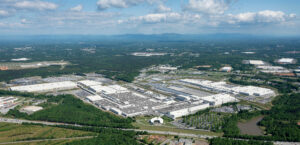
BMW bringing production of fully-electric models to U.S. at Plant Spartanburg
By onAnnouncements | Market Trends
The BMW Group has invested $1.7 billion to begin U.S. production of fully electric vehicles (EVs) at its Plant Spartanburg in South Carolina.
The majority of the investment, $1 billion, will be used to prepare for EV production operations at the plant. The rest will be used to build a more than 1 million-square-foot high-voltage battery assembly facility in nearby Woodruff, South Carolina. BMW plans to build at least six fully electric BMW X models in the U.S. by 2030.
BMW has also signed an agreement with Envision AESC to source next-generation lithium-ion battery cells from the company. Envision AESC has plans to build a new plant in South Carolina to supply Plant Spartanburg. The annual capacity of the battery cell factory will be up to 30 GWh.
“For decades, Plant Spartanburg has been a cornerstone of the global success of the BMW Group,” said BMW Group Chairman of the Board of Management Oliver Zipse, in a news release. “The home of the BMW X models that are so popular all over the world. …That means: The ‘Home of the X’ is also becoming the ‘Home of the Battery Electric Vehicle.’ In addition, we can showcase BMW Group’s ‘local for local’ principle: Our newly developed sixth generation battery cells, which were specifically designed for the next generation electric vehicles, will be sourced here in South Carolina – where X goes electric.”
The partnership with Envision AESC is “an important step in the BMW Group’s plan to strengthen its regional supply chains,” BMW said.
Envision will produce newly developed round lithium-ion battery cells, which were specifically designed for the sixth generation of BMW eDrive technology, and will be used in the OEM’s next-gen electric vehicles. The new battery format will increase energy density by more than 20%, improve charging speed by up to 30%, and enhance range by up to 30% while reducing CO2 emissions from cell production by up to 60% through the partial use of secondary lithium, cobalt and nickel material as well as renewable energy for production.
Plant Spartanburg currently produces lithium-ion battery modules for two BMW plug-in hybrid electric vehicles (PHEVs) that are built at the plant — the X3 xDrive30e and X5 xDrive45e. Nearly 70,000 electrified BMWs were built there last year. The X3, X4, X5, X6 and X7 Sports Activity Vehicles and four M models are also produced at the plant.
While working toward “a sustainable future” and the reduction of greenhouse gas emissions, BMW “is following a path of ‘technology openness’ to offer a choice of fully electric, plug-in hybrid electric, and highly-efficient internal combustion options to its customers in meeting their diverse needs in vastly different geographies across the nation,” the release states. BMW aims to make half of its global sales from battery electric vehicles (BEVs) by 2030 and has set an initial target to reduce CO2 emissions by 40% per vehicle by the same year.
In the U.S., BMW currently offers two fully electric vehicles — the iX Sports Activity Vehicle and the i4 Gran Coupe. The fully electric i7 Sedan is slated to make it to market later this year.
